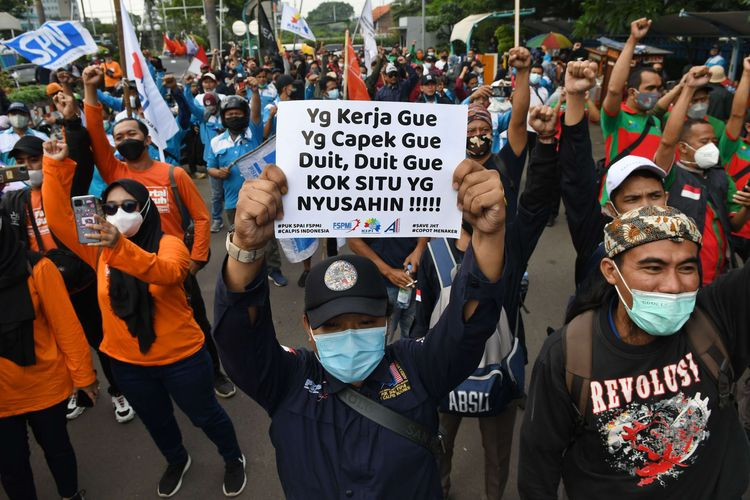Popular Reads
Top Results
Can't find what you're looking for?
View all search resultsPopular Reads
Top Results
Can't find what you're looking for?
View all search resultsGetting the wrong ends of the stick: The pensions debate
The government’s policy to insist on delayed JHT disbursement is the right policy in the wrong situation.
Change text size
Gift Premium Articles
to Anyone
T
he Indonesian media and the public, especially workers, have been thrown into a national polemic regarding the pension fund (JHT), one of the social security schemes for workers administered by state insurers.
The polemic began after the release of Manpower Ministerial Regulation No. 2/2022 about the disbursement mechanism of JHT benefits on Feb. 4. Nearly 400,000 people have signed an online petition to urge the government to withdraw the decree, which stipulates that the JHT can only be withdrawn when workers reach 56 years of age.
Nonetheless, this is not a new dispute. In 2015, the government issued a similar regulation, and it was soon followed by waves of labor demonstrations nationwide, which pushed the government to withdraw the regulation.
Why does the same dispute repeat now?
In our opinion, it is because both the government and workers defend their position from their own perspectives, which is not wrong, but the arguments become misconstrued. This dispute is like two wrong ends of the same stick.
From the government’s point of view, the new regulation will return the JHT to its original purpose, to shield workers from old-age poverty. Meanwhile, workers oppose the regulation because, from their point of view, they had their salaries deducted for years and need access to the money immediately, hence waiting until 56 years of age is too long.
To entangle the debate, we should first make it clear that both sides have an equally reasonable point of view. The government is correct to hold onto the concept of risk protection against long-term risk i.e. old-age poverty through delaying the disbursement time to retirement age.
Meanwhile, workers are also right because their concern is about present financial insecurity, which means poverty for them is literally within sight. They might face poverty immediately, once they are laid off or resign, not in the next 10 or 16 years.
Subsequently, we need to understand that social security schemes such as health, work accident, old age or pensions and death insurance were designed with economic and employment stability in mind. The schemes assume that people work one stable job with a permanent contract until they retire and die. Sickness and accident benefits were included because they interrupt workers’ productivity and income. When social security is implemented in its classical schemes in Indonesia’s current situation, two problems may arise.
First, the Indonesian labor market does not offer job security, one of the basic assumptions of a social security design is that it demands some sort of stability and regularity to be able to fulfill the actuarial principle of insurance. When one’s job is insecure, for instance, consisting of multiple short-term contracts at the same company, or short-term contracts in different companies, or is low paid, it is hard to prepare for old-age savings because perhaps there is hardly anything left at the end of the month. Therefore, in workers’ experience, job insecurity and unemployment are the biggest and present dangers, not the future, old-age poverty risk.
Second, Indonesians in general are not familiar with planning for the distant future such as for old-age or retirement. This makes policies like the JHT that include longer-term risk protection difficult to implement. About 70 percent of the elderly are dependent on and living with their families or children to survive old age, according to data from the National Team for the Acceleration of Poverty Reduction (TNP2K) in 2018. Prakarsa’s survey in 2020 found that almost 90 percent of productive age respondents did not have preparation for old age.
More than 72 percent said they would depend on family i.e. their offspring and the government in their old-age and about 28 percent had no idea. These are worrying issues because Indonesians’ life expectancy is increasing, and an aging population will erode any demographic bonus and turn it into a demographic disaster. The same survey found that four in five people over 65 years live in poverty and have no guaranteed income. This means old-age poverty is real.
What to do next is to put the right policy in the right situation. The government’s policy to insist on delayed JHT disbursement is the right policy in the wrong situation. Workers’ demand to disburse the JHT at any time is the wrong demand in the right situation. Social policy is supposed to address social problems. The problem of employment insecurity should be addressed through unemployment benefits, which is the spirit of the unemployment fund (JKP). The JKP serves as a contingency fund for people in between jobs or while being jobless.
Therefore, the JKP needs to be improved in terms of coverage and access for workers. The problem of low wages should be addressed through wage subsidies, which the wage subsidy assistance fund (BSU) is trying to address. Similarly, the access and coverage of the BSU need to be broadened.
In the meantime, the government should also realize that there are workers who cannot afford to save because of low wages, but there are also workers who do not save because of low pension literacy and low financial literacy in general. Delaying disbursement of the JHT to 56 years of age could feel like a punishment to the former.
The government’s homework is to ensure that workers are not punished by the insecurity of the Indonesian labor market, but also to urge those who can afford to save and insure to participate in social security programs hence raising their awareness about the risk of old-age poverty.
The writers are researchers on social policy issues at the Prakarsa Center for Welfare Studies.










